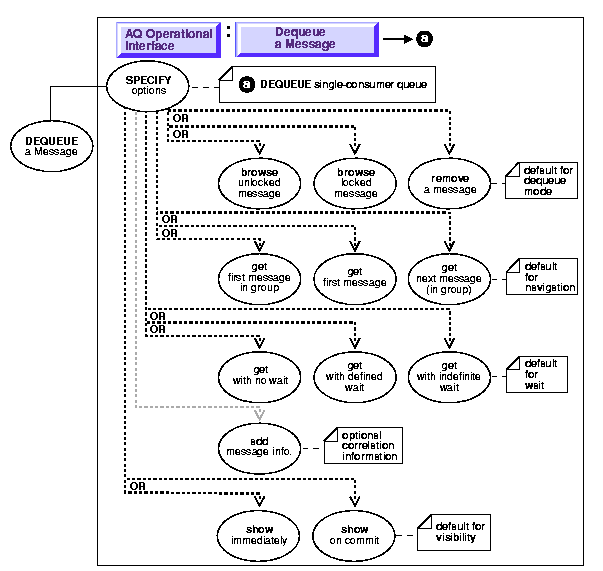Release 2 (8.1.6)
Part Number A76938-01
Library |
Product |
Contents |
Index |
| Oracle8i Application Developer's Guide - Advanced Queuing Release 2 (8.1.6) Part Number A76938-01 |
|
Operational Interface: Basic Operations, 12 of 16

To specify the options available for the dequeue operation.
Typically, you expect the consumer of messages to access messages using the dequeue interface. You can view processed messages or messages still to be processed by browsing by message id or by using SELECTs.
See Chapter 3, "AQ Programmatic Environments" for a list of available functions in each programmatic environment. Use the following syntax references for each programmatic environment:
See Chapter 3, "AQ Programmatic Environments" for a list of available functions in each programmatic environment. Examples in the following programmatic environments are provided:
/* Dequeue from msg_queue: */ DECLARE dequeue_options dbms_aq.dequeue_options_t; message_properties dbms_aq.message_properties_t; message_handle RAW(16); message aq.message_typ; BEGIN DBMS_AQ.DEQUEUE( queue_name => 'msg_queue', dequeue_options => dequeue_options, message_properties => message_properties, payload => message, msgid => message_handle); DBMS_OUTPUT.PUT_LINE ('Message: ' || message.subject || ' ... ' || message.text ); COMMIT; END;
/* Dequeue a message with correlation id = 'RUSH' */ public static void example(AQSession aq_sess) throws AQException, SQLException { AQQueue queue; AQMessage message; AQRawPayload raw_payload; AQDequeueOption deq_option; byte[] b_array; Connection db_conn; db_conn = ((AQOracleSession)aq_sess).getDBConnection(); queue = aq_sess.getQueue ("aq", "msg_queue"); /* Create a AQDequeueOption object with default options: */ deq_option = new AQDequeueOption(); deq_option.setCorrelation("RUSH"); /* Dequeue a message */ message = queue.dequeue(deq_option); System.out.println("Successful dequeue"); /* Retrieve raw data from the message: */ raw_payload = message.getRawPayload(); b_array = raw_payload.getBytes(); db_conn.commit(); }
Dequeuing messages of RAW type
'Dequeue the first message available Q.Dequeue() Set Msg = Q.QMsg 'Display the message content MsgBox Msg.Value 'Dequeue the first message available without removing it ' from the queue Q.DequeueMode = ORAAQ_DEQ_BROWSE 'Dequeue the first message with the correlation identifier ' equal to "RELATIVE_MSG_ID" Q.Navigation = ORAAQ_DQ_FIRST_MSG Q.correlate = "RELATIVE_MESSAGE_ID" Q.Dequeue 'Dequeue the next message with the correlation identifier ' of "RELATIVE_MSG_ID" Q.Navigation = ORAAQ_DQ_NEXT_MSG Q.Dequeue() 'Dequeue the first high priority message Msg.Priority = ORAQMSG_HIGH_PRIORITY Q.Dequeue() 'Dequeue the message enqueued with message id of Msgid_1 Q.DequeueMsgid = Msgid_1 Q.Dequeue() 'Dequeue the message meant for "ANDY" Q.consumer = "ANDY" Q.Dequeue() 'Return immediately if there is no message on the queue Q.wait = ORAAQ_DQ_NOWAIT Q.Dequeue()
Dequeuing messages of Oracle object type
Set OraObj = DB.CreateOraObject("MESSAGE_TYPE") Set QMsg = Q.AQMsg(1, "MESSAGE_TYPE") 'Dequeue the first message available without removing it Q.Dequeue() OraObj = QMsg.Value 'Display the subject and data MsgBox OraObj!subject & OraObj!Data
|
|
 Copyright © 1996-2000, Oracle Corporation. All Rights Reserved. |
|